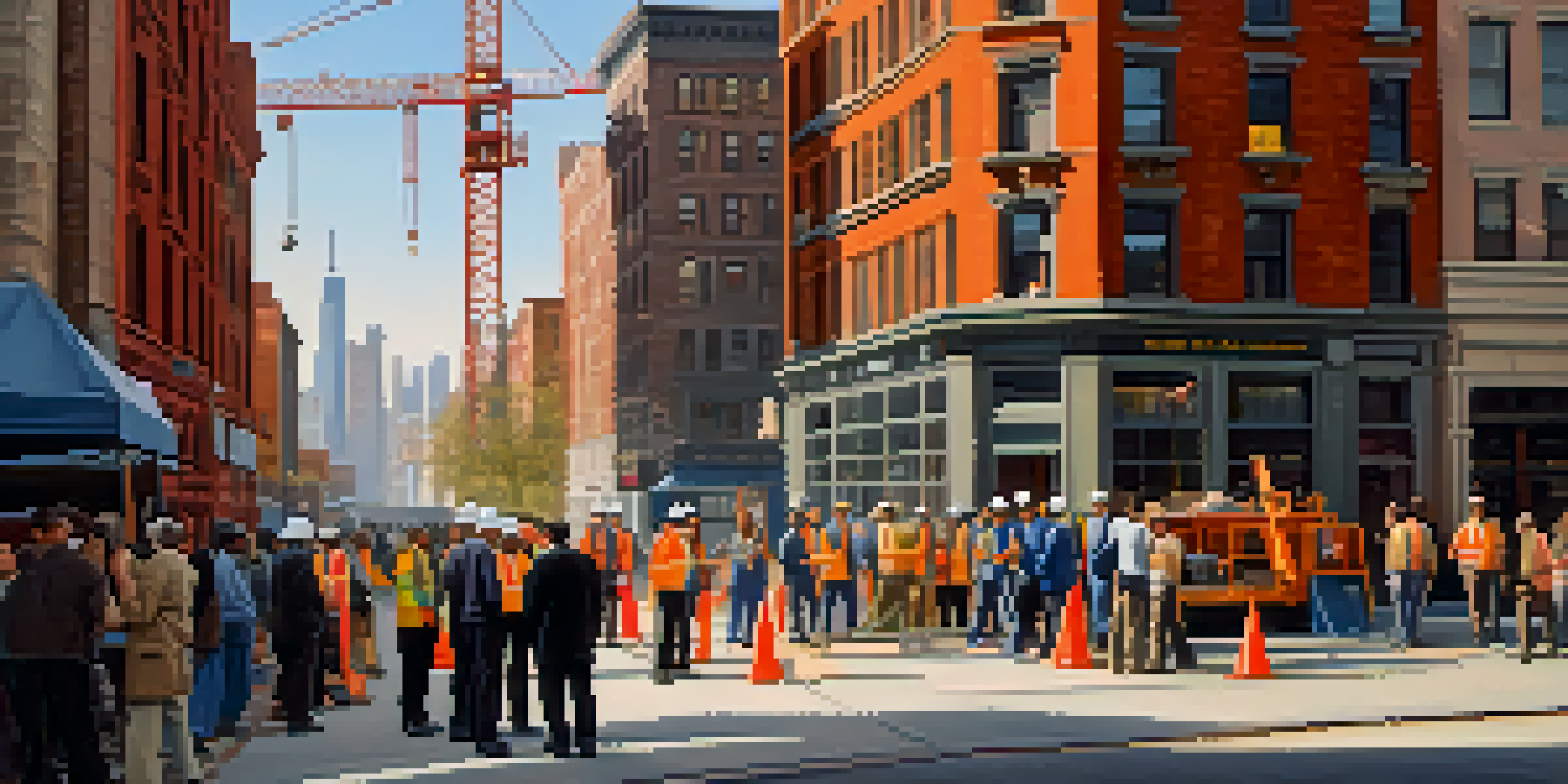Building Permits: A Guide for NYC Real Estate Developers

Understanding Building Permits in New York City
Building permits in New York City are essential for ensuring that construction projects comply with local laws and regulations. These permits serve as a formal approval from the city, allowing developers to proceed with their projects legally. Without the proper permits, you risk hefty fines and delays that can derail your project.
The best way to predict the future is to create it.
In essence, a building permit is like a ticket that grants you permission to build or modify a property. It covers various aspects such as zoning, structural safety, and environmental impact. Understanding this process is crucial for any real estate developer looking to succeed in the bustling NYC market.
Moreover, knowing the different types of permits—such as construction, alteration, and demolition—can save you time and resources. Each type has its specific requirements and timelines, which can significantly affect your project schedule.
Key Steps in the Building Permit Application Process
The first step in obtaining a building permit is to gather all necessary documentation, including architectural plans and site surveys. This paperwork is crucial, as it provides the city with a clear understanding of your project. Additionally, it's wise to consult with a licensed architect or engineer to ensure everything is in order.

Once your documents are prepared, the next step is to submit your application through the NYC Department of Buildings (DOB) portal. This online system allows you to track your application’s status in real-time, making the process more transparent and manageable. It's essential to be thorough and accurate in your submission to avoid delays.
Building Permits are Essential
Building permits ensure compliance with NYC laws, preventing costly fines and project delays.
Finally, after submission, your application will undergo a review process that can take anywhere from a few weeks to several months. During this time, city officials may request additional information or modifications to your plans, so staying responsive and communicative is key.
Common Challenges Developers Face with Permits
Navigating the building permit process in NYC can be fraught with challenges, one of which is the complexity of zoning laws. These laws dictate what can be built and where, which can lead to unexpected hurdles if you're not well-versed in them. Many developers find themselves needing to adjust their plans to comply with these regulations.
Success usually comes to those who are too busy to be looking for it.
Another common issue is the potential for delays during the review process. The high volume of applications submitted to the DOB can lead to backlogs, and your project may be stuck in limbo as you wait for approval. To mitigate this, it’s beneficial to maintain open communication with city officials and be proactive in addressing any concerns they raise.
Lastly, unforeseen costs can also arise, particularly if additional inspections or permits are required. By budgeting for these possibilities from the outset, you can avoid financial strains that could impact your project’s overall success.
The Importance of Hiring Experienced Professionals
Working with experienced professionals, such as architects, engineers, and permit expediters, can significantly streamline the building permit process. These experts understand the intricacies of NYC regulations and can help you navigate potential pitfalls. Their knowledge can be invaluable in ensuring your application is complete and compliant.
For example, a permit expediter specializes in managing the permit submission process and can often expedite reviews. This can save you a considerable amount of time and alleviate stress. They know how to present your project effectively to city officials, increasing the chances of swift approval.
Hire Experts for Success
Working with experienced professionals can streamline the permit process and help navigate complex regulations.
Additionally, seasoned professionals can provide insights into the latest code changes and trends in the industry. This knowledge allows you to stay ahead of the curve and adapt your plans accordingly, ultimately leading to a more successful development.
Understanding Fees and Costs Associated with Permits
Building permits come with various fees that can vary based on the scope and size of your project. These fees are typically calculated based on the estimated construction cost, and they can include application fees, inspection fees, and even fees for plan reviews. Understanding these costs upfront can help you budget more effectively.
In addition to standard fees, other expenses may arise due to special permits or additional inspections. For example, if your project is located in a historic district, you may need to pay extra for preservation reviews. Being aware of these potential costs can prevent surprises down the line.
It's also worth noting that some permits may have renewal fees if your project extends beyond the initial timeframe. Staying informed about these financial obligations can help keep your project on track and within budget.
Navigating the Appeals Process for Denied Permits
If your building permit application is denied, don't lose hope. NYC has a structured appeals process that allows you to contest the decision. Understanding this process can empower you to take the necessary steps to get your project back on track.
The first step in appealing a denied permit is to carefully review the reasons for the denial. Often, the denial may stem from minor issues that can be easily rectified. Gathering additional documentation or making adjustments to your plans can often resolve these concerns.
Stay Aware of Costs
Understanding various permit fees and potential additional costs helps in effective budgeting for your project.
Once you’ve addressed the reasons for denial, you can submit an appeal to the Board of Standards and Appeals (BSA). This board reviews the case and makes a determination, which can lead to a reversal of the denial. Having a solid understanding of your project and the city’s regulations will strengthen your case during this process.
Staying Informed: Resources for Developers
As a real estate developer in NYC, staying informed about changes in building codes and regulations is crucial. Fortunately, there are numerous resources available to help you keep up-to-date. Websites like the NYC Department of Buildings offer a wealth of information, including guidelines, forms, and updates on local laws.
Additionally, joining industry organizations such as the Real Estate Board of New York can provide valuable networking opportunities and access to educational resources. These organizations often host events and workshops that cover the latest trends and best practices in real estate development.

Lastly, consider subscribing to industry publications or newsletters that focus on real estate development in New York City. These resources can provide insights into market trends, regulatory changes, and tips from experienced developers, helping you navigate the complexities of the industry effectively.